Fri 15 May 2009
DORNFORD YATES AND THE CLUBLAND HEROES, by David L. Vineyard.
Posted by Steve under Authors[22] Comments
by David L. Vineyard
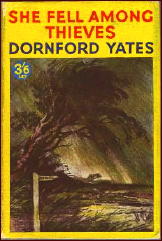
You should be warned before venturing into Dornford Yates country that there is no middle ground. Either you will be charmed and drawn in to the never-never land of his mostly between-the-wars adventure tales set in a Europe that owes more to Anthony Hope’s Ruritania or George Barr McCutcheon’s Graustark (Yates own Ruritania was the mythical Carinthia) than Eric Ambler’s back alleys, or you will throw up your hands in disgust. There’s little in the way of gray area when it comes to Yates.
Yates was in reality Major Cecil William Mercer (1885-1960), a solicitor and the son of a solicitor (two of the three writers Richard Usborne calls the “Clubland” writers, Yates and Buchan, are solicitors, which may or may not mean something) and a cousin of H.H. Munro (Saki), seems to have been a bit of a crank and certainly thoroughly unpleasant.
Pawky, bossy, and quick to take offense, his reaction to World War II was largely to complain he had to leave his French home, and his reaction to Post-War England was so violent he picked up and moved to Rhodesia where he ensconced himself in a small personal fiefdom.
Neither A. J Smithers’ biography (Dornford Yates, A Biography) nor O. F. Snelling’s biographical sketch (“The Disagreeable Dornford Yates” at Wes Britton’s SpyWise blog) manage to project a very likable individual, and Richard Usborne, whose book The Clubland Heroes is the major study of Yates, Sapper, and John Buchan’s fiction, recounts how Yates threatened legal action when contacted because Usborne misused the term cad. Luckily it is the fiction and not the man under review here.
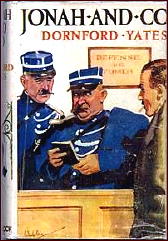
From the early twenties into the fifties, Yates wrote some of the most delightful books of his era. The Wodehousian books about Berry and Company are light-hearted romps featuring upper middle class Englishmen and women and their hijinks at home and abroad (smuggling of goods to avoid the duties was virtually a sport in Yates novels). The tone is light and playful, and the books retain much of their original charm.
The thrillers feature much the same European settings, and Jonah (Jonathan) Mansel ties the two types of books together, but while he’s still bossy in the Berry books, the Mansel of the thrillers is an altogether more dangerous character who once killed a man (the splendidly named Barabbus) with a single blow of his fist. (William Chandos, Mansel’s second in command and hero of his own books also does for a villain with a single blow, though in his case, Goat, is only a henchman, not a master criminal.)
The Mansel books and some non-series works usually team Mansel with William Richard Chandos, and George Hanbury, a pair of younger men who were sent down from Oxford after beating up some Bolshies (keep in mind this is written while the Russian Revolution was still making headlines).
In the first of the thrillers, Blind Corner, Chandos and Hanbury are on the Continent when they stumble on a murder, and the dying Englishman leads them home where a clue in the collar of the dead man’s dog eventually leads to Mansel, who has the ear of the Foreign Office, Scotland Yard, the Surete, and it is suggested MI6.
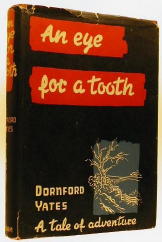
Soon they are up to their necks along with their servants Carson, Bell, and Rowley (no Yates hero would go abroad without a servant in company) in battle against Count Axel the Red, and before it’s over splitting a notable treasure among themselves and the servants.
This adventure takes them to Carinthia and Castle Wagensburg, where Mansel notes with some pleasure: “If you fought a duel with a pair of Lewis guns nobody’d take the trouble to come see what it was.” (Incidentally that odd apostrophe d for “nobody would” is a typical Yates touch. He sprinkles them everywhere.)
Names play a great role in the pleasures of Yates. Among the thrillers, titles like Cost Price, She Fell Among Thieves, Red Sky at Morning, Lower than Vermin, An Eye For a Tooth, Storm Music, and Perishable Goods promise what they deliver.
Then there are the villains (rotters to a man) like Count Axel, Rose Noble, Duke Saul of Varvic, Barabbus, Casca de Palk (“the English Willie with a mouth full of teeth and an Oxford accent”), Lord Withyham, Oliver Bleeding, Erny Balch, Daniel Gedge, Douglas Bladder, Boris Blurt, Coker Falk (an American), Sycamore Tight, and Major Von Blodgenbruck among the rogues’ gallery, with helpers whose names are things like Jute Shade (a crooked private detective), Goat, Lousy, and Sweaty.
Yates is also a great one for fine place names like the Castles of Gath, Midian, and Jezeel, and estates like White Ladies, Gracidieu, Break o’ Day, Poke Abbas, and Mockery Hall. There’s even a village named Broad i’ the Beam.
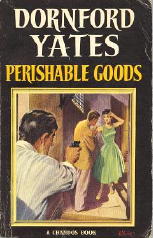
Dickens’s lower middle class sentimentality probably didn’t sit well with Yates, but his character names most certainly did. He has a less than kind view of his own profession as well, with solicitors like Biretta and Cain, Aaron and Stench, and Oxen and Baal not uncommon. (It’s a wonder they ever got a client.)
Whole volumes could be written about Yates use of the English language, but it suits the novels well. Berry, warned he will get his hands dirty during a bit of second story work replies:
“That were impossible … If I massaged a goat in a coal-mine, I couldn’t get these hands dirty.”
or this from Mansel in Perishable Goods:
“But for the whistle I heard, that it was not you, Chandos, would never have entered my mind.”
and:
“Rose Noble may have a fine hand, but he knows us too well to sleep sound when we are out of his ken.”
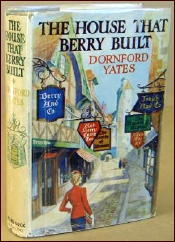
and something must be said of Jonah’ highhandedness as in The House That Berry Built, when he has done for the wretch Stapely:
“An unknown man is found dead, We can do for the details later, don’t you agree, Falcon? (Superintendent Falcon of the Yard)”
Philo Vance or Sherlock Holmes could hardly have done it better. Falcon, naturally, agrees. Only villains ever balk at Jonah’s commands, and they usually end badly.
Where women play little role in the novels of Sapper or Buchan, they are important in Yates world. Phyllis Drummond largely exists to be kidnapped in Sapper’s (H.C. McNeile) Bulldog Drummond books and Irma Peterson mostly to do the kidnapping and seek revenge for the death of her beloved Carl.
Buchan’s women tended to be practical and boyish, but not particularly attractive, though Janet Roylance in John McNab and Kore Arabin in The Dancing Floor have their moments.
This isn’t to suggest Yates is a proto-feminist, but the ladies who occupy his books are smart and attractive and well worth the risks involved rescuing them. There’s even a hint of sex that raises its head in Yates such as when Mansel has John Bagot and Audrey Nuenham registered as man and wife in French hotels while on the run after Bagot has already had to strip her unconscious form and rub her down after a near drowning.
Or take Storm Music where the hero and heroine take refuge in an idyllic woodland cabin, take time out for a skinny dip in a remote forest glade, and spend the night together during a magnificent thunderstorm. Nothing is ever stated, but there is a good deal implied, or inferred by the reader. And the ladies often set their sights for Chandos or Mansel, though in Mansel’s case to no use.
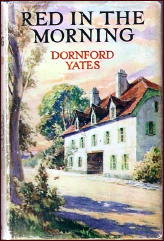
And there is no shortage of deadly traps in the books. Castle walls must be laid siege to, and some very nasty dungeons escaped. In Red Sky at Morning a remote schloss has a treacherous Judas floor that very nearly does our heroes in (a Judas floor is one built on a pivot that when released can drop you into a nasty inescapable dungeon underneath) and the threat of ending in some cold moat or down a Jacob’s ladder ala The Prisoner of Zenda is always present.
Barzun and Taylor praised Yates for his use of “Sturm und Drang” in A Catalogue of Crime, and it’s an apt phrase, for weather and scenery and setting play a large role in the charms of the books. Storms roll across the tops of mountains, fogs hamper deadly races along treacherous roads, and natural wonders like waterfalls are always good for dispatching villains or first glimpsing a beautiful damsel. Yates took the term “blood and thunder” literally and never skimps on either. It’s almost impossible to write about Yates and not use the term full-blooded.
Like most of the heroes of the era Mansel and company are a law unto themselves, and seldom waste time with the authorities, save for a bit of cleanup at the end. They have a particular disregard for customs authorities, and Mansel’s Rolls and Aston Martin both have secret compartments used to smuggle treasure, brandy, and his sealyingham terrier, Tester past nosy customs men. (It’s been suggested that Mansel’s Aston Martin inspired James Bond’s in Goldfinger.)
The books are adventure, thrillers, not detective stories, though Yates did write one detective novel, Ne’er-Do-Well (1954) in which Superintendent Falcon relates a case to Chandos and Mansel, but Yates proves no threat to Agatha Christie. Clever puzzlers were not his forte. But most of the books, humorous and serious have criminous ties, and all are informed with an almost addictive sense of adventure as a form of play (as opposed to duty in Buchan).
Readers interested in Yates will find A.J. Smithers book Dornford Yates, A Biography and Richard Usborne’s The Clubland Heroes invaluable. Usborne’s book is perhaps the only one to really study the phenomena of Yates, Sapper, and Buchan’s ‘shockers’ and is a classic in the field. Luckily it has been reprinted often enough that it isn’t hard to find or particularly expensive when found. I have relied on it heavily in writing this since my Yates books are currently still boxed up.
For those wanting to dip their toes in, but not invest any money, several of the Berry books are available as free ebooks at Project Gutenberg and Manybooks to be read online or downloaded.
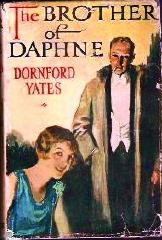
One of the short stories from Brother of Daphne was adapted as an episode of the BBC series Hannay about John Buchan’s hero Richard Hannay, and the first episode of Mystery! shown in this country was She Fell Among Thieves, with Malcolm McDowell as Chandos and Michael Jayston (Nicholas and Alexandria and Quiller) as Mansel.
There is also a musical with lyrics by Yates. Sadly the books were never adapted to film in their day, which is a shame, since they are cinematic and romantic, and the Berry books would make a wonderful television series, all done with a light touch.
Yates isn’t going to be for every taste, but if you like a bit of adventure, the romance of low-slung cars on treacherous roads at high speeds, dastardly villains, clever heroes, and worthy heroines Yates is your man. True, the term Snobbery with Violence could have been coined to describe Yates novels, but if you are very sensitive to class consciousness you probably won’t be reading much between the wars fiction anyway.
Yates is the kind of writer designed for a stormy night and a roaring fire with a cat snoring in your lap and or a good dog at your feet, even if you are really reading in bed with the television on for background noise. Reading Yates is the next best thing to a pipe and smoking jacket, and a good deal more comfortable and healthy.
But I warn you. His particular brand of the whole Clubland scene can be addictive.
May 27th, 2009 at 3:10 am
Excellent precis of this genre…Only a small minded PC mentality could object to the “ethical” retribution visited upon the villans of these novels…. Buchan, Yates, Sapper, and of course Edgar Wallace’s “Just Men” – “Sanders” – “Reeder” all of which would be vilified nowdays, but if read with an understanding of the times, are just wonderfully enthralling and evocative.
May 28th, 2009 at 2:52 pm
Allan
The key here is, as you say, understanding the times. Many modern readers don’t have a sense of history, and they’re simply not interested in books more than 10 years old.
I know, because they’ve told me.
— Steve
March 5th, 2010 at 11:58 am
I suspect the residents of Klagenfurt and Villach might be surprised to learn that they are living in a mythical land – Carinthia, or as the Austrians call it Karnten, is a very real place, even if it is not in reality quite so empty as Yates would have it.
April 23rd, 2010 at 9:04 am
A shame that a generally sympathetic essay is so riddled with factual error.
For example:
Goat was killed by his own boss, Friar, not by Chandos.
Hanbury was not with Chandos when he encountered the murder.
The dog’s collar did not lead Chandos to Mansel. They became acquainted by chance.
They did not battle against Axel the Red, who died centuries previously; their adversary was “Rose” Noble.
Casca de Palk was not “an English Willie . . . ” but a Frenchman.
Oxen was a “well-known author” and a murderer, not a solicitor, crooked or otherwise.
The Judas floor is in “An Eye for a Tooth” not “Red in the Morning”.
Mansel never owned an Aston Martin. The only “real” make of car in any Yates book is a Rolls – so there can be no link with James Bond.
But full marks for recommending a splendid writer.
April 26th, 2010 at 9:04 pm
James
Thanks for the corrections and other comments.
Much of what I referred to in the article was taken from Richard Usborne’s The Clubland Heroes, along with my own memories. As I mentioned my Yates books were packed away where I couldn’t get to them at the time.
The Aston-Martin reference was either from Kingsley Amis The James Bond Dossier or O.F. Snelling’s James Bond a Report. One of them refers to Mansel having an Aston Martin with a secret compartment for smuggling his dog off and onto the Continent. I just assumed it was in one of the books I hadn’t read, since in the ones I had read he always drove a Rolls.
I may have misread that though. Anyway, the tricked-out car was the part the writer suggested Fleming took for James Bond, and it seems likely Fleming read Yates, especially reading some of the passages in Goldfinger and with Fleming’s penchant for names.
In any case Amis, Snelling, and Usborne all point out the Yates connection to Fleming and Bond. It isn’t unique to me, and since they were my gateway to Yates, I followed their lead.
I will give you all the other points, but knowing Fleming’s age and the type books he read, and from some internal evidence in the books themselves the Bond tie to Yates is fairly obvious, though it goes without saying none of the Clubland Heroes would have approved of Bond and likely not Fleming.
Snelling in particular has written quite a bit about Yates, so for now I’ll take his word for the connection. At least three other people noticed it.
Usborne refers to Casca de Palk as an ‘English Willie’ — I don’t know why. He also refers to Oxen as a solicitor. Usborne is largely considered to be the authority, and here I relied heavily on him.
I was probably unclear about the dog’s collar, which leads Chandos into the adventure and the adventure leads him to becoming acquainted with Mansel. You’re right, of course, Chandos is alone when he finds the body.
You are also right about the Judas floor. Re Goat, I must have the wrong henchman, but I do recall Chandos taking one out with a single blow. The point was that Chandos only gets to kill a henchman, Mansel kills Barabus, the lead villain.
I meant Axel the Red as just an example of Yates splendid use of names, but in retrospect it sounds as if I meant he was a villain they battled with.
Thanks again for the corrections.
February 19th, 2011 at 6:17 pm
Splendid discussions. For those who have not read the Chandos books, or Anthony Lyveden and Valerie French, I beg you to do so: because when you do, you will be irreversibly hooked and read them again and again, just to wallow luxuriously on Summer afternoons in a world where “crooks were simply crooks and got what was coming to them” (Tom Sharpe, Vintage Stuff): a world long gone but much lamented by many.
August 22nd, 2011 at 2:54 am
As an avid reader in the 50’s and loaning
my books to friend who moved and never returned
them I have been trying to find some for years found one in the second hand book shop in Alnwick Northumberland moved and lost it before I could read it. Does anyone know
where we can get them. Out of print not
in libraries.
October 2nd, 2011 at 4:45 pm
Regarding the query from V M Atkinson as to where D. Y’s books may be purchased. Amazon have most, if not all, available in book form and Kindle.
October 5th, 2011 at 2:48 am
http://www.abebooks.com came up with over 700 listings when “Dornford Yates” was searched on with quote marks to limit the search, some of the prices at the lower end of the listings are extraordinarily cheap – being less than half the postage.
I have bought books via this source (although not Dornford Yates) and been very satisfied except for an occasional book taking longer than the specified time by a week or so.
March 23rd, 2012 at 4:20 pm
I believe Dornford Yates took his pen-name from the surnames of his grandmothers – I just came across the record of the death in WWI of a Lt. Henry Mansel-Pleydell. This combination of names seems to be too great a coincidence – did Yates know the Dorset family? One of them was called Daphne too. Just curious!
June 9th, 2012 at 4:48 pm
Agree with the addictive nature of the series. I too have lost copies during removals, but have acquired all again by diligent searching – albeit not always in acceptable codition. Recently had all thirty-four books rebound in common format, and the collection is my pride and joy – re-read all thirty-four in the new hard binding …
June 25th, 2012 at 2:53 am
Like Gayle, I am re-building my collection, this time only with dust-jacketed volumes. The dust jackets appear amateurish to us today, but were – apparently – not objected to in their time. This is what I find so delightful about Yates’ work: he gives a window into his time which no retrospective account can do justice to, as contemporary accounts leave out what is irrelevant, puzzling, anachronistic or offensive to the contemporary mind. This may be out of sensibility to the young reader or even because of misguided selectivity by the writer. We, too, can scoff at the Enid Blyton-esque plot details, but at least we can make up our own minds as to how we appraise them. I have recently joined the Yahoo group on Dornford Yates.
January 10th, 2014 at 8:12 pm
Glad someone else has spotted the Mansel-Pleydell family and their Daphne – I recently tried to contact Smithers but Hodder & Stoughton can’t be bothered. For all I know he is dead but his primary interest appears to have been tanks and other militaria and the military boys may know him. I cannot trace any Mercer connection with Dorset (other than White Ladies in Hampshire) except that much later some M-Ps were to be found in Brighton (well Hove actually) The family started in 1815 when Colonel Mansel CB married a Miss Pleydell from Dorset.
January 14th, 2014 at 12:39 pm
By a strange coincide I was today trying for the umpteenth time to research the connection between my surname and Dornford Yates’s heroes and came across this thread with Brian Kealy’s relatively recent posting. I am a great-great-great grandson of Col John Mansel and Louisa Morton Pleydell, the double-barrelled name having been adopted by my great-great grandfather John, their eldest son who inherited the Morton Pleydell estates, the seat of which was Whatcombe House in Dorset. John M-Ps eldest son was my great-great uncle Edmund M-P (my great grandfather was Edmund’s brother John), who had two daughters, Daphne and Vivien (his sons Edmund and Henry were both killed in action in the Great War). Besides the interesting coincidence of those being the Christian names of two DY characters, Whatcombe – though in Dorset and not Hampshire – also bears a more than passing resemblance to White Ladies…
For an interesting and charmingly written piece of detective work as to why DY may have used the names Mansel and Pleydell see http://www.baronage.co.uk/2007a/Berry's%20Heraldry.pdf.
I would be intrigued to hear of any other theories as to the connection between my family and DY, of which we have no actual or anecdotal evidence. I have heard it suggested that Jonathan Mansel may have been based on my grandfather, Ralph M-P, who was a fairly dashing looking fellow (he served as Capt. in the Royal Field Artillery in WW1 and died in 1932 aged 36), but I have found nothing anywhere to substantiate this.
March 22nd, 2014 at 10:22 pm
Hello,
How little effort it takes to assume (win?) the moral high ground! I’ve been rereading Yates’ novels left by my deceased wife, and want to find a good home for them, not just unload them at a library sale. There are about 35 different titles, some in wrappers, some firsts. My e-mail is mimulus@charter.net.
Warm regards to all Yates fans!
Rich
April 24th, 2014 at 3:05 am
I have a theory having read C W Stamper’s book “What I Know” 1913/14 which was ghost written by Dornford Yates and has a dedication that effect. In the book King Edward visits Sir Everard Hambro at Milton Abbey and Lord Portman at Bryanston, I am sure that if you could read Stampers diary you would find others of the squirearchy in the area on the visiting list, including the Mansel-Pleydells of Whatcombe. Cecil William Mercer could/would have seen the name and used it in the first Windsor stories which became “The Brother of Daphne”. The timeline fits and Edward’s visits and the country house scene could have been the catalyst of the Berry books, the scene moved to Hampshire where he had been on a caravaning holiday. I bought Blind Corner (paperback) in W H Smith’s in Blandford Forum in 1958 when I was at school at Milton Abbey. In 1990 I visted A J Smithers, he loaned me all the files/correspondence had used to write the biography, the photocopier had a lot of use!! Best Wishes to you all, see the D Y Yahoo Group Graham.
September 7th, 2015 at 7:20 am
‘Hannay’ was not a “BBC series,” being made by a regional franchise of – and broadcast by – the ITV network.
October 8th, 2015 at 3:34 am
Just started reading Yates again and got to two weeks after Boy’s marriage to Adele ( Jonah and Co ) . Do any of the books deal with the breakup ? Adele obviously was not going to last because she had brown eyes, not grey:-)
December 2nd, 2015 at 7:14 am
I recently discovered Dornford Yates very recently. As a prolific book reader, I’ve now managed to obtain copies of virtually all of his books. His writing is superb and his descriptions of scenery and people are splendid. Many of the books have dust jackets but most are in very poor condition. I have a design and print company and have decided to re-create the dust jackets in one common classic design for each of the three series. They will look splendid on my bookshelves when finished.
December 7th, 2016 at 10:37 am
Hi Chris Powell;
Interested to hear about your new dust jackets. Did you go ahead and make them? Are they available for purchase? Half my Yates books have no jackets and I wouldn’t mind new ones…
September 3rd, 2017 at 4:51 pm
I have found most Dornford Yates novels through Abe Books very good website since reading Blind Corner at school, and recently finding his ‘House That Berry Built’ – Cockade, still there and as it was, in the Pyrenees (difficult to reach, up narrow twisting roads) when we were in Pau.
They have hundreds listed in order by price and condition, as agents for booksellers worldwide.
November 8th, 2024 at 8:30 am
In 1949 Ward Lock re-issued twenty-eight of Yates’ books in a uniform hardback edition with a dustjacket in red designed by Val Biro. Until 1952 the inside front flap of each jacket included a series of biographical notes. I have been trying to collect the full set and am currently short of the following –
Maiden Stakes – XII London (continued)
Period Stuff – XXIV either The Law (continued) or Authorship
An Eye For a Tooth – XXV Authorship
If anyone has these editions with the notes I would be pleased to hear from you.